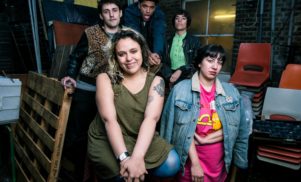Downtown Boys’s debut album, Full Communism, is a screaming, sweating, teeth-baring call-to-arms for anyone living in the margins, stuck in a bullshit McJob or struggling to find their way in the world. Robert Barry meets the righteous punk five-piece at an electric London gig to find out what’s fuelling their fire.
“Pick something to say ‘no’ to!” Victoria Ruiz demands, leaning over the edge of the stage at the packed back room of The Victoria. “It could be your racist boss, or your homophobic dad. It could be some thought in your head that keeps you from being able to go to bed. Have you got that thing to say no to? On the count of three, say ‘no’ as loud as you can. And then keep saying ‘no’ as loud as you can, forever and ever. One, two, three –” A deafening roar from the crowd. Four quick-fire drumstick clicks. A snarl of distorted guitar and everything erupts.
Watching them blow a crater in this intimate Dalston venue, you probably wouldn’t guess that this frenzied punk five-piece formed amid the chandelier-and-pillow-chocolate glamour of a luxury hotel. But that’s how it happened for Downtown Boys. When the band formed five years ago, Ruiz had just started working the phones at Rhode Island’s Renaissance Providence Hotel, where guitarist Joey La Neve DeFrancesco was delivering room service. To guests it may have felt like heaven, but for employees it was a factory powered by human bodies. “They’re making housekeeping clean 18 rooms a day,” says DeFrancesco. “People are getting all sorts of injuries and burns from these nasty chemicals. Wages are really low. You’re working two or three shifts a day. They’re stealing our tip money.”
Ruiz had been in Providence barely a week when she starting working at the Renaissance, and she soon joined DeFrancesco’s fight to unionise with other hotel employees and demand a living wage. “I remember we were trying to get a flyer throughout the hotel, which is actually incredibly difficult to do,” she explains. “You have to get a lawyer to look at the leaflet and make sure it’s okay because US labour laws are crazy. You have to organise workers to get it to people and to read it and discuss it. And it was just painfully difficult for some reason.”
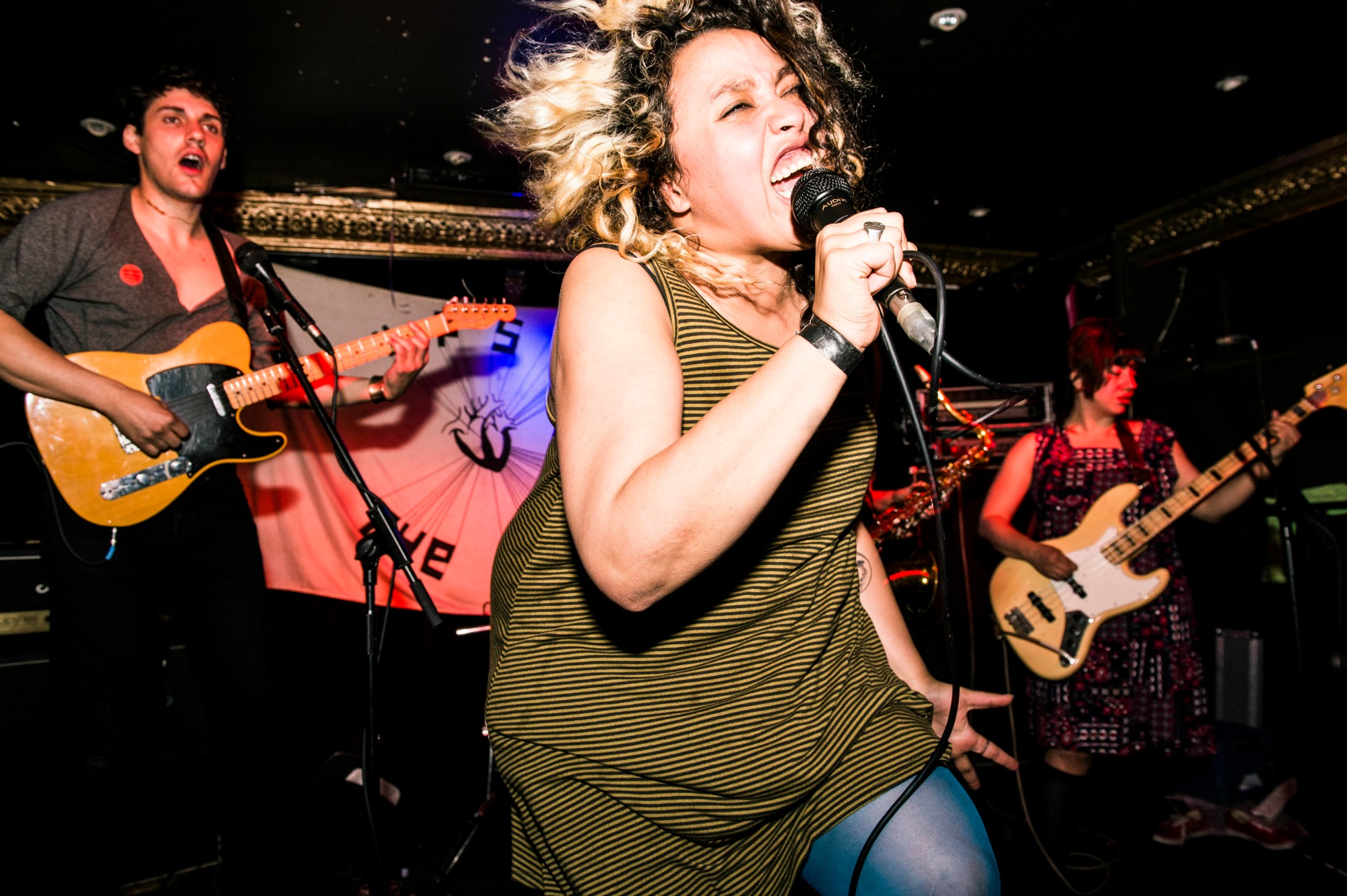
A chain email was passed back and forth with hotel employees adding their two cents’ worth. As they reached a low ebb in enthusiasm, DeFrancesco decided to send a video of Sun Ra and his Arkestra to the thread for inspiration. “I was actually living with one of the other hotel workers,” Ruiz recalls, “and I was just like, OH MY GOD, THIS IS SO BRILLIANT. And she was like, I don’t get it.”
Brought together by a love of Sun Ra and the material solidarity of being comrades in arms, working together, organising together, Downtown Boys are a lurching, screaming, sweating burst of righteous noise and urgent fury. Their debut album Full Communism, and especially its opener ‘Wave of History’, sounds like ‘Space is the Place’ covered by Minor Threat. Sun Ra, Ruiz confirms, has been “a huge influence.” A video of the group performing live in a record store in Connecticut finds her quoting the interstellar bandleader: “We have to go into outer space, for the world is far too dark and darkness breeds ignorance. But if we go to another planet, then there is something else out there that will be bigger and greater.”
In 2011, DeFrancesco quit the Renaissance Providence Hotel in grand style – accompanied by his seven-piece marching band, the What Cheer? Brigade. The video of that event, fulfilling as it did the fantasies of low-wage workers at bullshit jobs everywhere, went viral. Towards the end of that clip, as the trombones and oompah beat serenade DeFrancesco’s resignation, you can see Ruiz whooping and dancing along with them, and finally following the group out of the employee entrance.
“In the mid-to-late 2000s, there was a resurgence of these kind of protest marching bands,” DeFrancesco explains of the origins of What Cheer, the band that joined him that day at the hotel. “A lot of it was coming out of the anti-World Trade Organisation protests in Seattle. Bands would form in order to play along at protests, to get people amped up at picket lines, this sort of thing. So What Cheer was kind of the Providence incarnation of this idea. A band that could play a punk show and have it be fun and everyone dances, but can also play a picket line or a protest, just outside, anywhere.” Since 2005, the band has interspersed gigs at community benefits and illegal squat parties with stints accompanying the likes of Lightning Bolt, Dan Deacon, and Sage Francis.
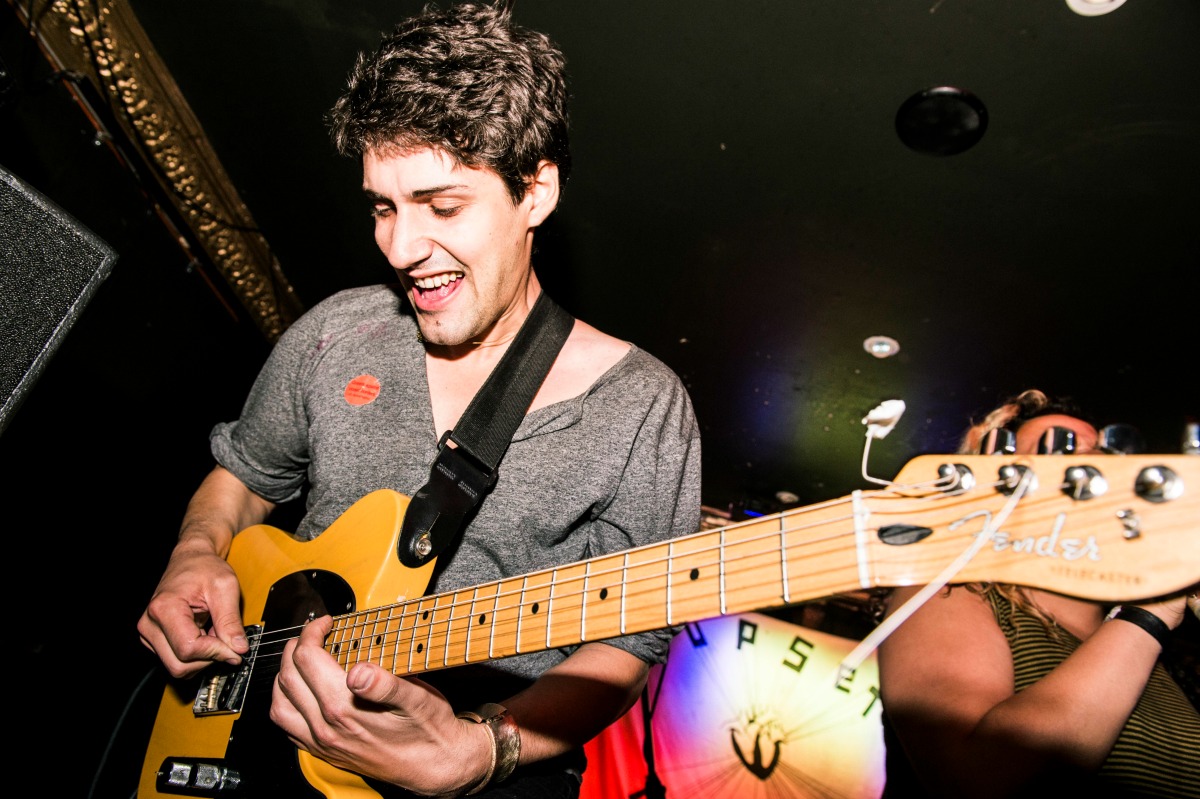
“To be contextless is a privilege. To be able to say, ‘I’m a blank slate’ and have people see nothing” Joey La Neve DeFrancesco
The What Cheer Brigade had already been around a few years before DeFrancesco joined. He had played tuba in his high school band, tricked into picking up the ungainly brass instrument when his band director “convinced me that it was a rare instrument and I’d get money to go to college if I played the tuba. Which is not true.” Finding himself paying his way through college through working at the hotel, he swore he’d never pick up the tuba again. “I thought, okay, I’m fucking done with the tuba. Then I saw this band playing in the street and I started talking to them and eventually tried out.” He stayed with the band for five years.
Downtown Boys drummer Norlan Olivo and their former bassist Daniel Schleifer were also both What Cheer members when they joined the band. Olivo was born in the Bronx and moved to Providence aged nine. By 18 he was hanging round a local non-profit called AS220, learning photography (he’s since exhibited his pictures in several galleries) and taking music classes run by Schleifer. “I’d never played drums before in my life,” he says. “But I took the class and Dan thought I was good at drums. He told me to come to try-outs [for What Cheer]. He thought I was older than I was – he thought I was 22.”
DeFrancesco had originally formed Downtown Boys – taking their name from a Bruce Springsteen lyric – in order to build a tighter unit and be “able to express some feelings and emotions and politics that we were going through that we couldn’t quite do with the brass band format.” Schleifer and Olivo were early joiners. “I’d never really played a drum set or punk rock music,” Olivo admits, having pounded just a bass drum in What Cheer, “but I said, okay, I learned how to do that, I can learn how to do this.” They played two or three shows before Ruiz joined as lead singer, at the height of their joint struggle with the hotel management. It was at that moment, as DeFrancesco has said in earlier interviews, that it “really came together to be something special.”
Special they certainly are. Onstage at The Victoria in Dalston they have an energy unlike any band I’ve seen before, like a street party on the verge of becoming a very friendly riot. The urgent rhythms of Olivo and Schleifer’s replacement on bass, Mary Regalado, drive the band along like a freight train. Adrienne Berry’s sax lines intertwine sinuously with DeFrancesco’s guitar and Ruiz’s voice. Their short, sharp songs are punctuated by shouted discourse from Ruiz, at once angry tirade and warm community rally, always on the point of inviting the whole crowd up with them to join their tight collective.
“Pick something to say ‘no’ to!” Ruiz demands, leaning over the edge of the stage. “It could be your racist boss, or your homophobic dad. It could be some thought in your head that keeps you from being able to go to bed. Have you got that thing to say no to? On the count of three, say ‘no’ as loud as you can. And then keep saying ‘no’ as loud as you can, forever and ever. One, two, three –” A deafening roar from the crowd. Four quick-fire drumstick clicks. A snarl of distorted guitar and everything erupts.
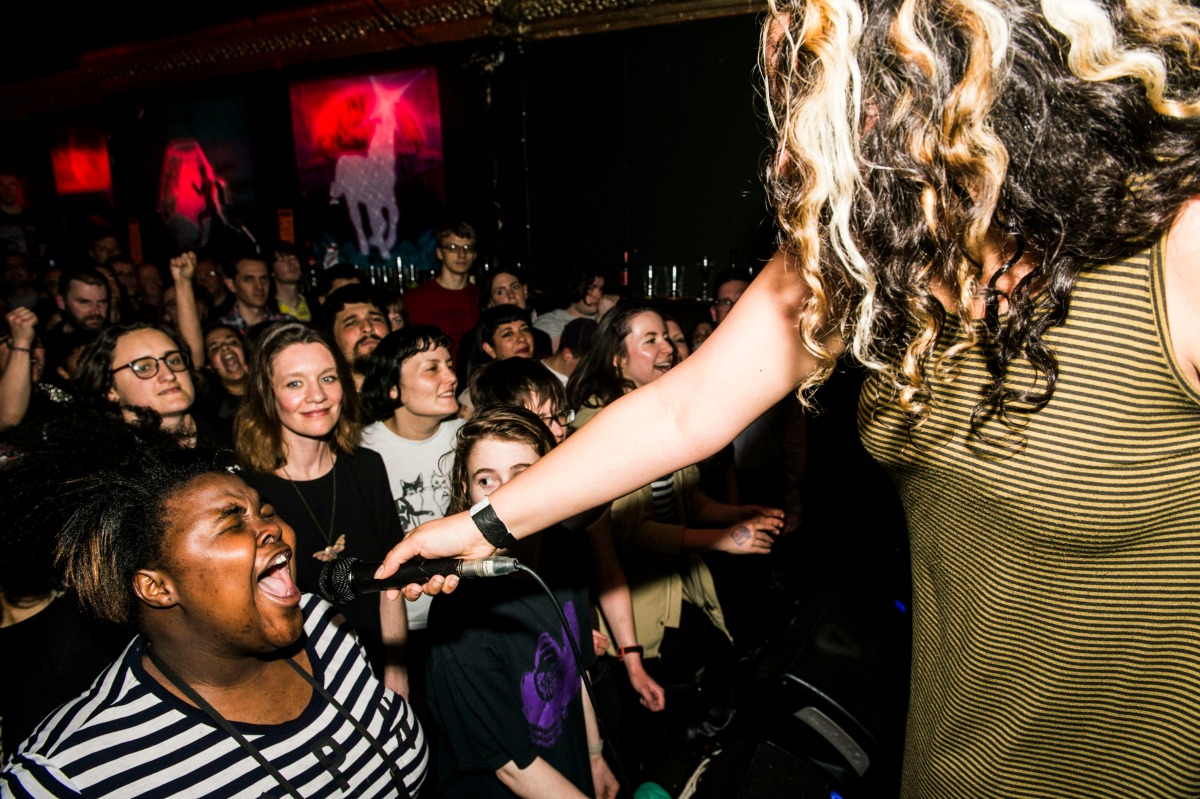
“Our tactics are to agitate people, talk to people, build up relationships, build community” Victoria Ruiz
“It’s about just meeting people where they’re at,” Ruiz says of the relationships she’s trying to build with their audiences. “And to try not to exclude people.” Olivo agrees. “It never really works to just slap someone on the hand or tell them they’re doing something wrong and walk away. Through our band, we’re having these dialogues with people that I think are much better than that.”
The group continue to be engaged with grassroots activism, in particular through the website Spark Mag, edited by Ruiz and DeFrancesco in collaboration with activist network Demand Progress, which runs artist profiles alongside campaigns for net neutrality and against email spying. Behind both the band’s music and their campaigning work is “the same core of wanting to use as much time and space as possible to push the parameters of the status quo and challenge hegemony,” says Ruiz.
“One of the cool things about punk music, and hip hop as well,” adds DeFrancesco, “is that a lot of it is based on certain sounds you hear at street demonstrations, and the same gestures as well. Repetition is extremely important – to the point where things can become sing-alongs and chants. There’s a community-building aspect to the chanting part, and a message-getting-out aspect to the types of repetition that you hear.”
“We call upon a lot of the same tactics,” Ruiz says, “which are to agitate people, talk to people, build up relationships with people, build community. But winning looks different.”
One of the things that comes across most strongly from listening to Downtown Boys is an extended sense of time. Onstage they are a rush of immediacy, but check out the video to ‘Wave of History’ to find a montage of infographics explaining a history of white exploitation of native Americans and people of colour, as well as a list of corporations that continue to profit from it. The very title Full Communism seems to reach towards a future not quite graspable. It’s a world away from the be-here-now, in-the-moment contextlessness of most white rock.
“To be contextless is a privilege,” DeFrancesco tells me backstage before the gig. “To be able to say, ‘I’m a blank slate’ and have people see nothing. You have to be a very specific type of person.”
“You also have to be a specific type of person to see nothing,” Ruiz chimes in. “The consumer of art is just as much of a problem as the art itself now.”
In Rhode Island, with its many former textile factories which once powered one of the industrial centres of America, history is inescapable. “A lot of the buildings we’re practising in and performing in have such a dark history,” DeFrancesco points out. “The people who were working in the factories, kids working 14 hours a day earning almost nothing, and producing materials out of cotton which is all coming from slave plantations down south. It’s very heavily imbued with these ghosts, all over the place.
“So I’m thinking, what does it mean to be making cultural production in these sites, historically, of this other kind of production? There’s a nihilistic impulse sometimes that is just [saying], what we’re doing right now matters and that’s totally divided from these things. But for me, in Providence, that just seems all the more absurd because you’re literally thinking and saying that bullshit in these fucking buildings.”
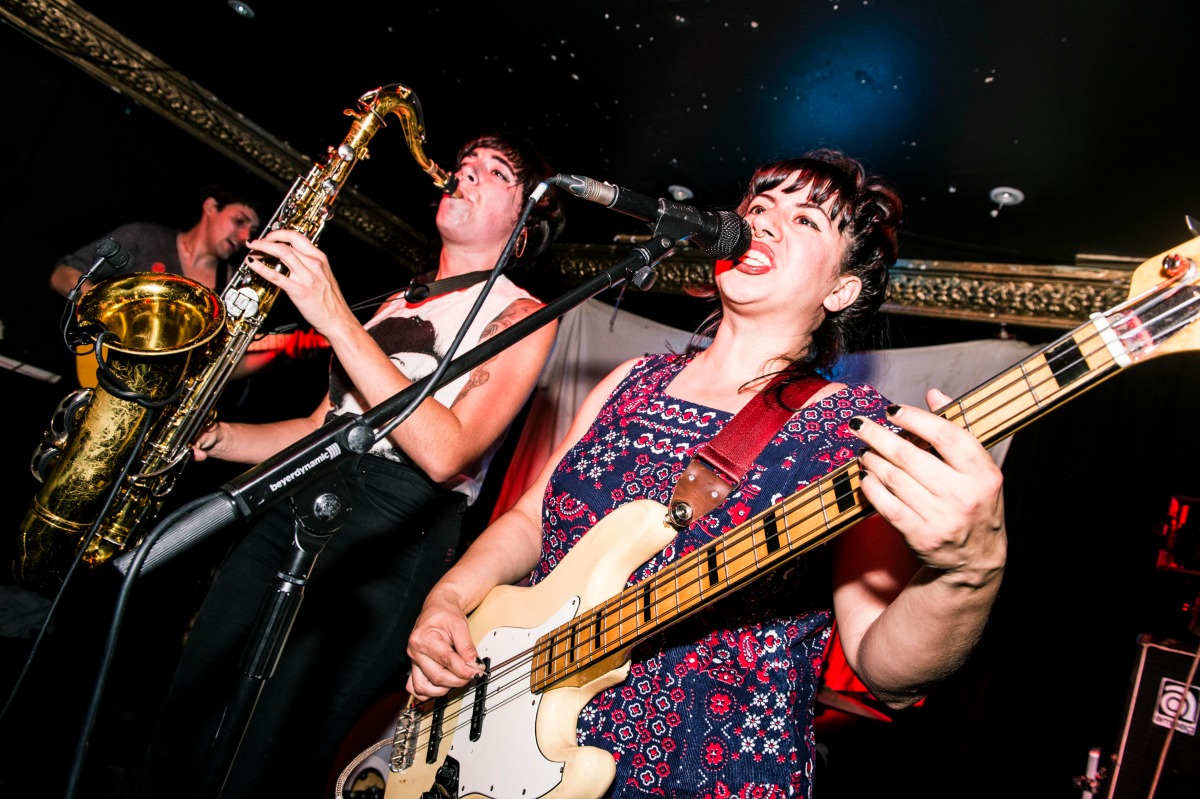
But what does it really mean to demand full communism at a time when Americans are about to be offered a choice between Donald Trump and Hillary Clinton?
“I think that no matter how hopeless and cynical we need to be at times,” DeFrancesco replies, “at the end of it, you have to believe that something better can happen everywhere – or even just in a room, for a little while. There has to be that hope and desire left for anger to exist. There’s a lot of anger on the record, but a lot of it is because there is some hope for the beautiful things that already exist.”
Later in the evening, Ruiz stalks the stage like a boxer between bouts. “This next song,” she sighs, “is like when you’ve been directly affected by something, and you sit around with a group of people talking about this thing. So, like, they’re talking about immigration, or about workers on low wages, or about anti-discriminatory laws, and you’re like, though I’ve actually been affected by it, I just don’t know how to talk about it like you.”
There’s a cheer from the crowd. Her voice grows more pugnacious. “But maybe it wasn’t ever about being able to talk about it like them. Because the people like them are always trying to turn us into this other thing, this thing to talk about.” There’s a splash of cymbals, a buzz from the guitar, tension rises. “We’re done talking.” Click-click-click-click–––
Robert Barry is on Twitter
Read next: Mark Fisher on The Pop Group’s enduring radicalism



















